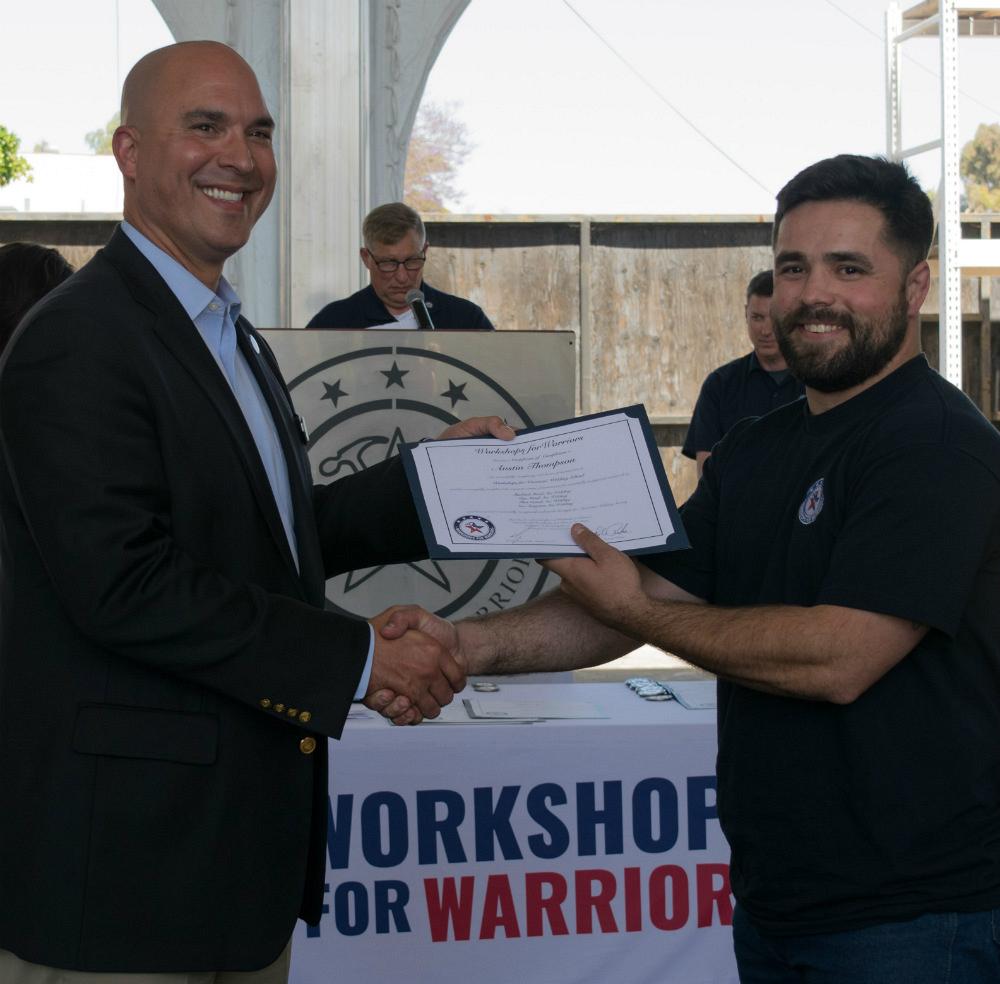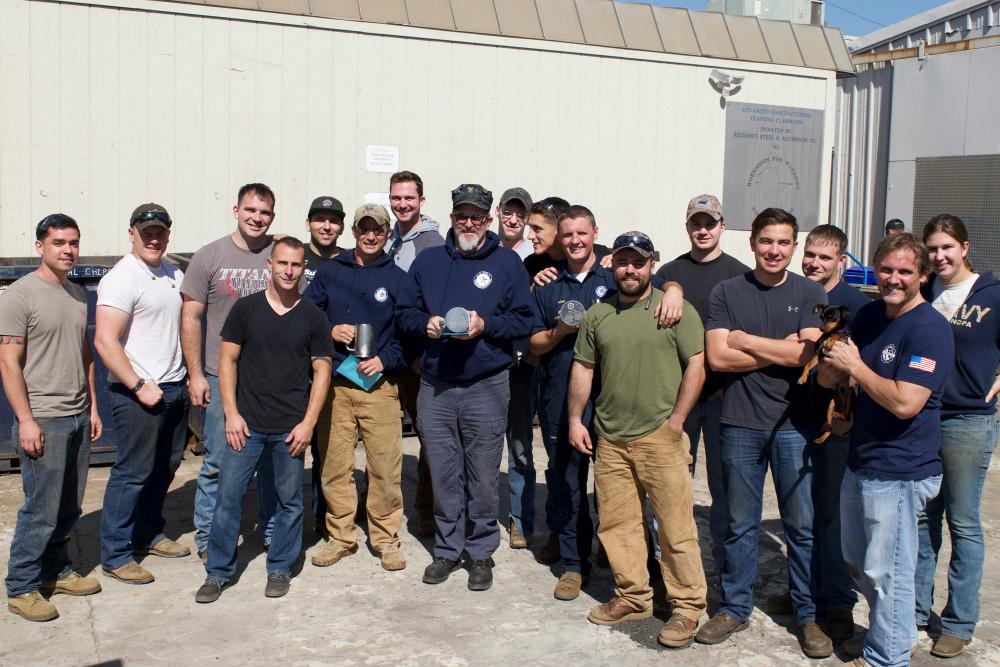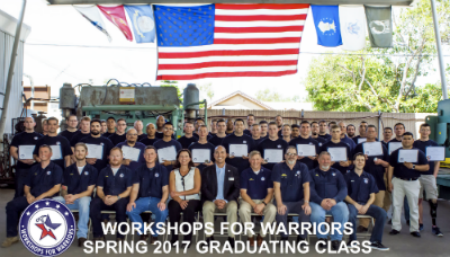- FMA
- The Fabricator
- FABTECH
- Canadian Metalworking
Categories
- Additive Manufacturing
- Aluminum Welding
- Arc Welding
- Assembly and Joining
- Automation and Robotics
- Bending and Forming
- Consumables
- Cutting and Weld Prep
- Electric Vehicles
- En Español
- Finishing
- Hydroforming
- Laser Cutting
- Laser Welding
- Machining
- Manufacturing Software
- Materials Handling
- Metals/Materials
- Oxyfuel Cutting
- Plasma Cutting
- Power Tools
- Punching and Other Holemaking
- Roll Forming
- Safety
- Sawing
- Shearing
- Shop Management
- Testing and Measuring
- Tube and Pipe Fabrication
- Tube and Pipe Production
- Waterjet Cutting
Industry Directory
Webcasts
Podcasts
FAB 40
Advertise
Subscribe
Account Login
Search
On a mission
Training veterans for advanced manufacturing jobs—a true win-win
- By Vicki Bell
- June 21, 2017
- Article
- Shop Management

Austin Thompson, U.S. Marine Corps veteran and graduate of Workshops for Warriors.
Photo courtesy of Workshops for Warriors.
From campaign promises to nonprofit solicitations, we hear a lot about the needs of veterans of the U.S. armed forces. Their health care, support, and job opportunities are lacking, and various entities purport to be “on a mission” to help. Perhaps no other is doing more to improve the lives and livelihood of returning veterans than Workshops for Warriors (WFW). At the same time, the organization is doing something tangible to help address the country’s skilled-labor shortage.
Founded in 2008, WFW, a state-licensed, board-governed, fully audited, 501(c)(3) nonprofit school, provides quality, hands-on training; accredited STEM educational programs; and opportunities to earn third-party nationally recognized credentials in machining and welding at no charge to the veteran. Its goal is to enable veterans to be successfully placed in their chosen advanced manufacturing career field, along with helping to rebuild America’s advanced manufacturing workforce.
Advanced manufacturing classes in welding, CAD/CAM programming (SolidWorks® and Mastercam®), CNC machining (CNC milling, CNC turning, CNC laser, and CNC waterjet, and 3-D printing) are taught through classroom education and extensive hands-on training on 11 CNC Haas mills and lathes, an Amada laser, Flow waterjet, three 3-D printers, and 18 welding booths.
Currently based in and operated out of San Diego, Calif., WFW is in expansion mode with plans to set up operations in other U.S. manufacturing hubs in the near future.
So, what exactly does the program entail, and how does it benefit veterans? Who better to answer those questions than a recent graduate? Austin Thompson, who enlisted in the U.S. Marine Corps in December 2010 and served for six years on active duty, including deployment to Okinawa, Japan, recently participated in a Q&A with thefabricator.com.
thefabricator.com: Did you have difficulty finding meaningful work after you returned to civilian life?
Thompson: I have only been out of the military for seven months, and most of that time I have been attending WFW. As I make the transition from school to the workforce, I'm sure there will be some degree of difficulty.
thefabricator.com: Did you or other veterans you know struggle with employment, housing, or other issues?
Thompson: I have been lucky so far because my wife is an active duty service member. I do, however, have friends that have transitioned and their plans have fallen through. They ended up back home and are struggling to get by.
thefabricator.com: How did you hear about WFW? Did you know anyone involved with the program?

Austin Thompson receiving his certification of completion from Hernàn Luis y Prado, founder and president of Workshops for Warriors.
Photo courtesy of Workshops for Warriors.
Thompson: As I was getting ready to leave the Marine Corps, I began developing a plan with an officer I was working for. I told him I was interested in going to school for welding, and he directed me to the American Welding Society website, where I found WFW.
thefabricator.com: What steps did you have to take to join the program?
Thompson: After I read through WFW’s website, I filled out the application and got in contact with their education coordinator and set up a time to come in for an orientation. After walking around their facility, meeting the instructors, and seeing what the school had to offer, I knew I had to be a part of the program.
thefabricator.com: What was involved in your training? Was there an internship/apprenticeship? What kind of certification did you receive?
Thompson: The first thing was classroom work. After I completed that, it was straight to welding. The school is very hands-on and not as classroom-oriented, which worked well for me because I learn better by getting out there and getting my hands dirty. I received five nationally recognized credentials in shielded metal arc, gas metal arc, flux cored arc, and gas tungsten arc welding.
thefabricator.com: How would you rate the instruction you received? Is there anything you would change?
Thompson: The instruction I received was first-class. The lead-day welding instructor has to be one of the smartest men I have ever come into contact with when it comes to welding, inspecting, and fabricating. It seemed like there wasn't a question my fellow students or I had that he didn't have an answer for, and if he didn’t, he was prompt about getting the correct answer for us. The only thing I would change is I would have liked to have been there longer to further my knowledge and pick my instructor’s brain for more knowledge.
thefabricator.com: Are you optimistic about your job opportunities? Have you already landed a job in the field for which you’ve been trained?
Thompson: I have not landed a job yet, but I am confident that with the skills I have acquired and the knowledge I have received from the instructors and the program, I will be able to find a quality job as soon as I get to my destination.
thefabricator.com: How do you envision your future now? What are you working to achieve?
Thompson: My future looks bright. I am excited to see what it holds for me in this field. I chose welding because my wife is active duty Navy, and with her never knowing where we will end up, welding has provided me the opportunity and the skills to find work wherever we may wind up next.
thefabricator.com: How would you describe the impact WFW has had on you or your life?
Thompson: WFW has opened up opportunities I never thought possible. I had never imagined becoming a welder and learning as much as I have about the field in the short amount of time I have been a part of the program. I now have a desired and sought-after skill set that will put me ahead of my peers in the workforce. I am confident that I will be successful in supporting my family.
thefabricator.com: What would you tell someone who is thinking about supporting this program to help with their decision?
Thompson: To anyone looking to invest in the future of transitioning service members and the future of this country, there is no better opportunity than through WFW. What this program has already accomplished and what they have planned for the future is unlike anything else in the country.
thefabricator.com: Is there anything else you would like to add or you think would be important to your success story?
Thompson: I would like to thank WFW for giving me the opportunity to be a part of their program. I now have a skill set that I will be able to take with me for the rest of my life and be able to support my family. Anyone can relate that the biggest struggle is being able to provide for the ones we love. WFW has given me that, and I will be forever grateful.
Undoubtedly, Thompson is not alone in his gratitude. To date, WFW has graduated more than 380 skilled machinists and welders, all from its original location. Imagine what can happen if its expansion plans come to fruition.
About the Author

Vicki Bell
2135 Point Blvd
Elgin, IL 60123
815-227-8209
subscribe now

The Fabricator is North America's leading magazine for the metal forming and fabricating industry. The magazine delivers the news, technical articles, and case histories that enable fabricators to do their jobs more efficiently. The Fabricator has served the industry since 1970.
start your free subscription- Stay connected from anywhere

Easily access valuable industry resources now with full access to the digital edition of The Fabricator.

Easily access valuable industry resources now with full access to the digital edition of The Welder.

Easily access valuable industry resources now with full access to the digital edition of The Tube and Pipe Journal.
- Podcasting
- Podcast:
- The Fabricator Podcast
- Published:
- 04/16/2024
- Running Time:
- 63:29
In this episode of The Fabricator Podcast, Caleb Chamberlain, co-founder and CEO of OSH Cut, discusses his company’s...
- Industry Events
16th Annual Safety Conference
- April 30 - May 1, 2024
- Elgin,
Pipe and Tube Conference
- May 21 - 22, 2024
- Omaha, NE
World-Class Roll Forming Workshop
- June 5 - 6, 2024
- Louisville, KY
Advanced Laser Application Workshop
- June 25 - 27, 2024
- Novi, MI

































